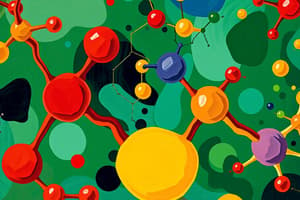Podcast
Questions and Answers
What do biological constraints refer to?
What do biological constraints refer to?
- Biological systems not affected by genetics or environment
- Complete absence of any boundaries for biological systems
- Unlimited freedom for biological systems to evolve
- Limitations, rules, or boundaries imposed on biological systems (correct)
How do biological constraints influence biological systems?
How do biological constraints influence biological systems?
- They have no influence on the behavior of biological systems
- They promote chaos in biological systems
- They guide the functioning and organization of biological systems (correct)
- They accelerate adaptation to changing environments
Why are neural network models considered limited in terms of biological plausibility?
Why are neural network models considered limited in terms of biological plausibility?
- Because they face challenges in being neurobiologically realistic (correct)
- Due to their flawless representation of cognitive processes
- Due to their perfect match with brain anatomy and physiology
- Because they are identical in structure to the actual human brain
What is the role of biological constraints in evolutionary theory?
What is the role of biological constraints in evolutionary theory?
What is the hope of researchers by improving neural network models biologically?
What is the hope of researchers by improving neural network models biologically?
What key concepts are associated with biological constraints mentioned in the text?
What key concepts are associated with biological constraints mentioned in the text?
What do biological constraints in biochemistry refer to?
What do biological constraints in biochemistry refer to?
How can understanding biological constraints in agriculture and biology be beneficial?
How can understanding biological constraints in agriculture and biology be beneficial?
What type of constraints can be physical in biochemical reactions?
What type of constraints can be physical in biochemical reactions?
In what way do biological constraints play a crucial role in shaping biological systems?
In what way do biological constraints play a crucial role in shaping biological systems?
What can researchers achieve by understanding constraints governing biochemical reactions?
What can researchers achieve by understanding constraints governing biochemical reactions?
How do biological constraints help researchers in the field of agriculture?
How do biological constraints help researchers in the field of agriculture?
Flashcards are hidden until you start studying
Study Notes
Understanding Biological Constraints
Biological constraints refer to the limitations, rules, or boundaries imposed upon biological systems due to various factors such as genetics, environmental influences, and evolutionary pressures. These constraints shape and guide the functioning of biological systems, influencing their behavior, organization, and adaptation to changing environments. There are several key concepts associated with biological constraints, including biological constraints in evolution, neural network models, and the role of constraints in shaping the outcomes of biochemical reactions.
Biological Constraints in Neural Network Models
Neural network models are a crucial tool for understanding and modeling complex brain functions. However, these models face challenges when it comes to being neurobiologically realistic. Although neural networks have advanced significantly over the years, their biological plausibility remains limited due to differences between model architectures and actual brain anatomy and physiology. By identifying areas where neural network models can be improved biologically, researchers hope to enhance our understanding of cognitive processes and ultimately develop more accurate models.
Biological Constraints in Evolution
Biologic constraints play a significant role in evolutionary theory. They shape the course of evolution by limiting the possibilities for change within a species or population. These constraints can arise from both internal factors, such as genetic inheritance, and external factors, such as environmental pressures. Understanding the nature and origin of these constraints helps us comprehend the patterns of evolution and the diversity of life forms on Earth.
Biological Constraints in Biochemical Reactions
In the realm of biochemistry, biological constraints refer to the factors that dictate the likelihood and outcomes of various reactions. These constraints can be physical, such as temperature and pressure, or biological, such as the presence of certain enzymes or regulatory molecules. By understanding the constraints governing biochemical reactions, researchers can develop strategies to optimize these processes or develop new applications in fields such as medicine and industry.
Biological Constraints in Agricultural and Biological Sciences
Biological constraints are also relevant in the context of agricultural and biological sciences. They can refer to factors that limit the productivity or efficiency of agricultural practices or biological processes. Understanding these constraints helps researchers develop strategies to overcome them, such as breeding new crop varieties or engineering biological systems for better disease resistance.
In conclusion, biological constraints play a crucial role in shaping the functioning of biological systems, from the development of neural networks to the evolution of complex organisms and the optimization of biochemical processes. By understanding these constraints, researchers can develop more accurate models, improve our understanding of evolutionary processes, and design more effective strategies for managing biological systems.
Studying That Suits You
Use AI to generate personalized quizzes and flashcards to suit your learning preferences.




